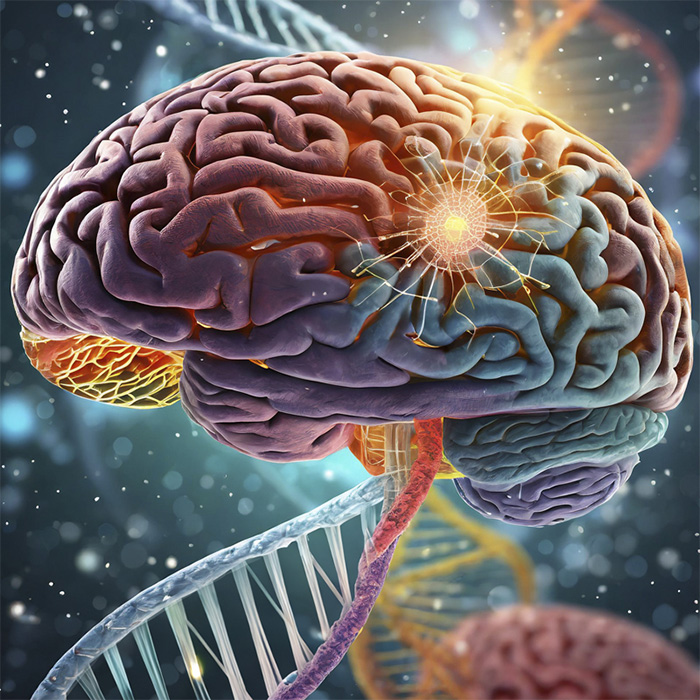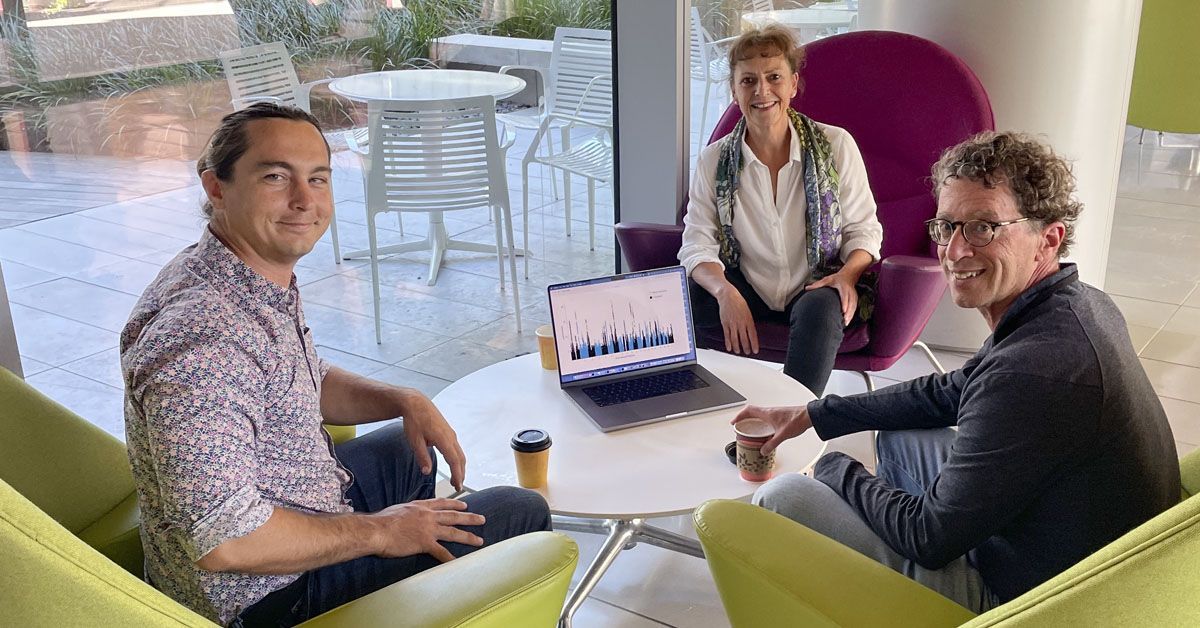Breakthrough Study on Post-Traumatic Stress Disorder
A collaboration of researchers, institutions and databases makes advances on the understanding of the genetic component of PTSD
Story by:
Media contact:
Published Date
Story by:
Media contact:
Share This:
Article Content
The Psychiatric Genetics Consortium (PGC), a consortium of researchers led by scientists at University of California San Diego School of Medicine has made significant advancements in the understanding of the neurobiology of post-traumatic stress disorder (PTSD), a condition the World Health Organization says affects some 250 million people around the world.
The group recently announced their findings from a genome-wide association study of 1,222,822 people in a paper recently published in the journal Nature Genetics.
Caroline M. Nievergelt, Ph.D., professor of psychiatry at UC San Diego School of Medicine, is the co-first author on the paper, together with Adam X. Maihofer, PhD., an assistant project scientist in Nievergelt’s lab. PGC-PTSD co-chair Murray B. Stein M.D., M.P.H., professor of psychiatry and public health at UC San Diego is also a co-author of the study.
Nievergelt explained that the work confirmed previous neurobiological studies of PTSD and built upon them, identifying 95 loci — positions of genes on a chromosome — significant to PTSD, including 80 new loci.
“As the number of samples has increased, we have gained a better understanding of the genetic factors that contribute to PTSD risk,” Stein said.
The paper underscores the importance of heritability in PTSD risk and notes that the identified genes influence processes related to PTSD symptoms such as stress, fear and threat responses. She said their findings also point to possible associations among PTSD and other mental and physical disorders.
The PGC was formed in 2007, dedicated to finding genes that predispose an individual to psychiatric disorders, such as bipolar disorder or schizophrenia, Nievergelt said. She added that each disorder is addressed by one of 11 working groups, one of which is the PGC for PTSD, which she chairs.
Nievergelt explained that the benefits of research by a consortium extend beyond the hive-mind input of numerous collaborators working toward a common goal. A genome-wide association study (GWAS) examines and compares genomes of a large number of people in a search for genetic markers associated with a specific condition. A GWAS for polygenic disorders such as PTSD necessarily requires an enormous sample size, she noted.
“And no one PI (principal investigator) is able to get nearly enough subjects for a genome-wide association study, so through the consortium we have a large number of collaborators combining data from all over the world,” Nievergelt said.
The PCG for PTSD consortium includes researchers from a wide number of research institutions and universities worldwide. Notable participants include co-chairs Karestan Koenen, Ph.D., from the Harvard Chan School of Public Health and the Broad Institute of MIT, and Kerry Ressler, M.D., Ph.D., of Harvard Medical School and McLean Hospital.

The brain, DNA, and a fractured glass effect as a PTSD metaphor. Photo by Adobe AI.
The consortium’s database was assembled from various sources, representing a variety of causes and levels of trauma. Nievergelt said the sources included the Marine Resiliency Study, in which U.S. Marine Corps members were assessed before and after going to war, and Army STARRS, a longitudinal study of U.S. Army soldiers. Another is the Grady Trauma Project that includes victims of violent crime, mostly African American individuals from inner cities. Other datasets incorporated into the PGC for PTSD megadata list came from Electronic Health Records (EHRs) and the VA Million Veterans Program. The consortium also incorporated data from Europe and Latin America.
At an appropriate stage, the consortium members agree on a data freeze and begin their examination, seeking to identify specific genes likely to be associated with PTSD. The paper represents “a milestone” in the understanding of the genetic component of PTSD, Nievergelt said.
“It’s the first time that we actually have a very strong genetic signal,” said Maihofer, who analyzed the data. The genetic signal — essentially a mapping of RNA or DNA activity relevant to PTSD — allowed the consortium to pinpoint specific genes and analyze pathways of gene expression for future research or even for eventual treatment strategies, Maihofer explained.
Nievergelt says there are several directions the consortium wants to take in terms of next steps. One is to increase and diversify the sample size. She said the group has received funding from the National Institute of Mental Health to go to Africa and enroll African people in the genetics study, an effort lead by co-chair Koenen. “That will help us improve risk prediction for other people of African ancestry, a group that has been relatively neglected in earlier studies,” Nievergelt noted.
UC San Diego co-authors
Authors affiliated with the University of California San Diego School of Medicine Department of Psychiatry, in addition to first authors Caroline M. Nievergelt and Adam X. Maihofer, are: Dewleen G. Baker, Carol E. Franz, William S. Kremen, Elizabeth A. Mikita, Sonya B. Norman, Matthew S. Panizzon and Murray B. Stein, also affiliated with the UCSD Herbert Wertheim School of Public Health and Human Longevity Science. Other UC San Diego authors are Anders M. Dale, of the Department of Radiology, Department of Neurosciences, and Wesley K. Thompson, of the Herbert Wertheim School of Public Health and Human Longevity Science.
Other noteworthy participants in the study
PGC-PTSD co-chairs:
Kerry J. Ressler, of the Department of Psychiatry at Harvard Medical School; McLean Hospital, and Department of Medicine (Biomedical Genetics), Boston University Chobanian & Avedisian School of Medicine; as well as Karestan C. Koenen, of the Department of Epidemiology at the Harvard T.H. Chan School of Public Health, the Broad Institute of MIT and Harvard, the Stanley Center for Psychiatric Research; and McLean Hospital Developmental Biopsychiatry Research Program.
Writing group members are:
Elizabeth G. Atkinson, Department of Molecular and Human Genetics, Baylor College of Medicine; Chia-Yen Chen, Biogen Inc.,Translational Sciences; Karmel W. Choi, Department of Epidemiology, Harvard T.H. Chan School of Public Health, and the Department of Psychiatry at Massachusetts General Hospital; Jonathan R. I. Coleman, King’s College London, National Institute for Health and Care Research Maudsley Biomedical Research Centre, and King’s College London, Social, Genetic and Developmental Psychiatry Centre, Institute of Psychiatry, Psychology and Neuroscience; Nikolaos P. Daskalakis, Broad Institute of MIT and Harvard, and the Stanley Center for Psychiatric Research in the Department of Psychiatry of Harvard Medical School, and the McLean Hospital, Center of Excellence in Depression and Anxiety Disorders; Laramie E. Duncan, Department of Psychiatry and Behavioral Sciences, Stanford University; Renato Polimanti, VA Connecticut Healthcare Center, and the Department of Psychiatry of Yale University School of Medicine.
Competing interest
Murray B. Stein has in the past three years received consulting income from Aptinyx, atai Life Sciences, BigHealth, Biogen, Bionomics, Boehringer Ingelheim, Delix Therapeutics, EmpowerPharm, Engrail Therapeutics, Janssen, Jazz Pharmaceuticals, Karuna Therapeutics, NeuroTrauma Sciences, Otsuka US, PureTech Health, Sage Therapeutics, and Roche/Genentech. He also has stock options in Oxeia Biopharmaceuticals and EpiVario. Anders M. Dale holds equity in CorTechs Labs and serves on the Scientific Advisory Board of Human Longevity and the Mohn Medical Imaging and Visualization Center, and also receives funding through research grants with General Electric Healthcare. Other authors associated with UCSD declare no competing interests.
Support and funding
Major financial support for the PGC-PTSD was provided by the National Institute of Mental Health (NIMH) grants R01MH106595 and R01MH124847, by the Cohen Veterans Bioscience and by the Stanley Center for Psychiatric Research at the Broad Institute.
Full lists of authors and their affiliations and competing interests, funding/support sources are available on the paper.
"No one PI (principal investigator) is able to get together nearly enough subjects for a genome-wide association study, so through the consortium we have a large number of collaborators combining data from all over the world."
Share This:
You May Also Like
Stay in the Know
Keep up with all the latest from UC San Diego. Subscribe to the newsletter today.




